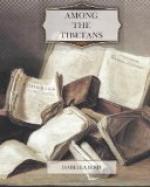Gyalpo, my horse, must not be forgotten—indeed, he cannot be, for he left the marks of his heels or teeth on every one. He was a beautiful creature, Badakshani bred, of Arab blood, a silver-grey, as light as a greyhound and as strong as a cart-horse. He was higher in the scale of intellect than any horse of my acquaintance. His cleverness at times suggested reasoning power, and his mischievousness a sense of humour. He walked five miles an hour, jumped like a deer, climbed like a yak, was strong and steady in perilous fords, tireless, hardy, hungry, frolicked along ledges of precipices and over crevassed glaciers, was absolutely fearless, and his slender legs and the use he made of them were the marvel of all. He was an enigma to the end. He was quite untamable, rejected all dainties with indignation, swung his heels into people’s faces when they went near him, ran at them with his teeth, seized unwary passers-by by their kamar bands, and shook them as a dog shakes a rat, would let no one go near him but Mando, for whom he formed at first sight a most singular attachment, but kicked and struck with his forefeet, his eyes all the time dancing with fun, so that one could never decide whether his ceaseless pranks were play or vice. He was always tethered in front of my tent with a rope twenty feet long, which left him practically free; he was as good as a watchdog, and his antics and enigmatical savagery were the life and terror of the camp. I was never weary of watching him, the curves of his form were so exquisite, his movements so lithe and rapid, his small head and restless little ears so full of life and expression, the variations in his manner so frequent, one moment savagely attacking some unwary stranger with a scream of rage, the next laying his lovely head against Mando’s cheek with a soft cooing sound and a childlike gentleness. When he was attacking anybody or frolicking, his movements and beauty can only be described by a phrase of the Apostle James, ‘the grace of the fashion of it.’ Colonel Durand, of Gilgit celebrity, to whom I am indebted for many other kindnesses, gave him to me in exchange for a cowardly, heavy Yarkand horse, and had previously vainly tried to tame him. His wild eyes were like those of a seagull. He had no kinship with humanity.
In addition, I had as escort an Afghan or Pathan, a soldier of the Maharajah’s irregular force of foreign mercenaries, who had been sent to meet me when I entered Kashmir. This man, Usman Shah, was a stage ruffian in appearance. He wore a turban of prodigious height ornamented with poppies or birds’ feathers, loved fantastic colours and ceaseless change of raiment, walked in front of me carrying a big sword over his shoulder, plundered and beat the people, terrified the women, and was eventually recognised at Leh as a murderer, and as great a ruffian in reality as he was in appearance. An attendant of this kind is a mistake. The brutality and rapacity he exercises naturally make the people cowardly or surly, and disinclined to trust a traveller so accompanied.




